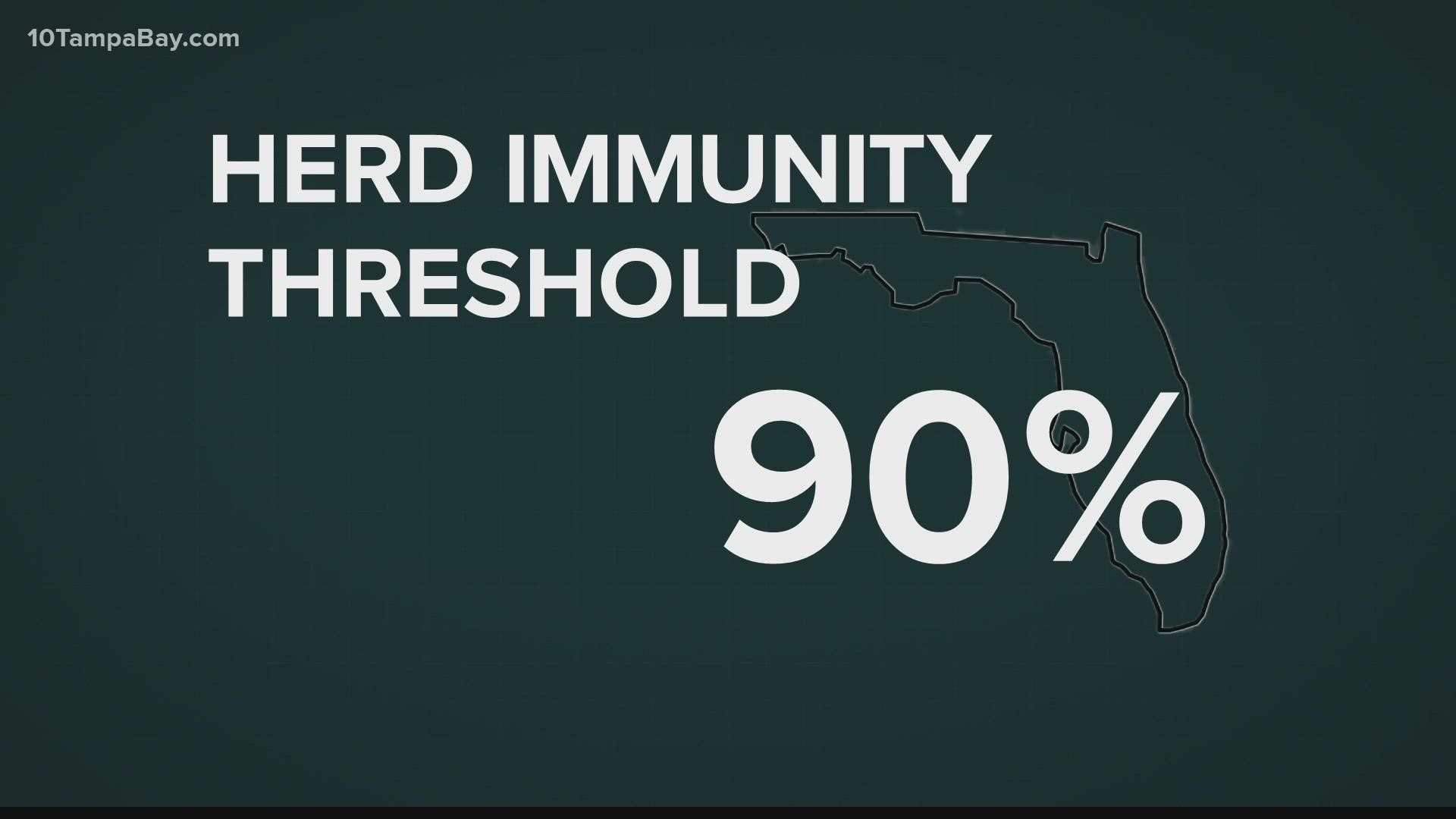TAMPA, Fla. — Herd immunity, it's a term you've likely heard before during the coronavirus pandemic, specifically during the nationwide rollout of the COVID-19 vaccine.
It's rooted in the idea that reaching a certain immunity threshold against the virus, whether that be through testing positive for the coronavirus or being vaccinated against, it would allow for a sense of normalcy to return to everyday life.
To achieve that, a certain percentage of the population would need to have some sense of immunity to an infectious disease, slowing down the rate at which it spreads.
Because of the delta variant, experts say reaching herd immunity just got harder.
Earlier in the pandemic, experts estimated around 70 percent of the population would have to be immune in order to reach herd immunity. Since then, the more transmissible delta variant emerged, pushing estimates up to around 80-90 percent.
"The problem here is that the delta variant is twice as more transmissible than the original virus. That pushes the overall population herd immunity thresholds much higher," said Dr. Ricardo Franco of the Infectious Diseases Society of America.
He estimates that the delta variant will require herd immunity threshold estimates to reach "well over 80-percent" to accomplish the goal.
Let's use Florida as an example. As of the Florida Department of Health's latest report from Aug. 6-12, 10,319,844 Floridians are considered to be fully vaccinated. In order for the state's 21.6 million residents to reach the higher end of experts estimates (90 percent), roughly 19.4 million people must be vaccinated.
It's a steep goal that CNBC reports Sir Andrew Pollard, head of the Oxford Vaccine Group, recently told British lawmakers that herd immunity was "mythical" given the instances of vaccinated people being infected by the delta variant.
RELATED: 'That's really bad news': Fauci finds low vaccination rates leave Florida vulnerable to COVID-19
“I think we are in a situation here with this current variant where herd immunity is not a possibility because it still infects vaccinated individuals,” he told the outlet. “And that does mean that anyone who’s still unvaccinated, at some point, will meet the virus. That might not be this month or next month, it might be next year, but at some point they will meet the virus and we don’t have anything that will stop that transmission.”
And Pollard is not alone. The director of Vaccine Research Group at the Mayo Clinic told The Seattle Times, by definition, it's "very unlikely" the U.S. will reach herd immunity. While an epidemiologist at the Harvard T.H. Chan School of Public Health also told the outlet that the idea of herd immunity is "damaging."
“It presents people with an unrealistic vision of how the pandemic comes to a close and doesn’t account for the evolution of either the virus or the nature of disease in reinfections," William Hanage said.
So how do we get to herd immunity? In Florida, USF Mathematical Modeler Dr. Edwin Michael says the state is already seeing an immunity level of around 75-percent, meaning approximately 25-percent of people remain susceptible.
He predicts once school-aged children under the age of 12 are able to be vaccinated, Florida will have a chance at meeting the required threshold, regardless of those who are refusing to be vaccinated.
Kids under the age of 12 are yet to be eligible to receive a COVID-19 vaccine. Currently, Pfizer is cleared for emergency use in those age 12 and up, while those who are 18 and up are only eligible for the Johnson & Johnson and Moderna vaccines.
In a recent interview with 10 Tampa Bay, the nation's top infectious disease expert, Dr. Anthony Fauci, said he would like to see that age limit drop for all three vaccines "as quickly as [it] possibly can" in an effort to help protect children, but that it's a decision that is independently up to the U.S. Food and Drug Administration.

